Preparee is the student improv theatre troupe from Leuven. I have been an active member since 2014, taught 50+ improv workshops, created new show formats, helped out with graphic design, and actively managed their web platforms.
Table of Contents
About Preparee
Preparee is a student improvisational theatre group founded in 2000 in Leuven. It is run completely for and by students.
Shows
Preparee organizes by far the largest improv shows in Belgium, thanks to our access to large auditoria from the KU Leuven and a large active group of students helping to promote the shows. We run about five large shows each year, each one in front of about 400-850 audience members.
Every year, Preparee organizes the Flemish Improcup, in which many large Flemish improv troupes send one delegate each. These improvisers are voted into the next rounds by the audience and a professional jury, until one remains, who is crowned the winner of the Flemish Improcup.

My contributions to the group
Posters
Over the years, I helped design many posters for the improv shows. A selection of posters I designed along with Marte Jespers is listed below:
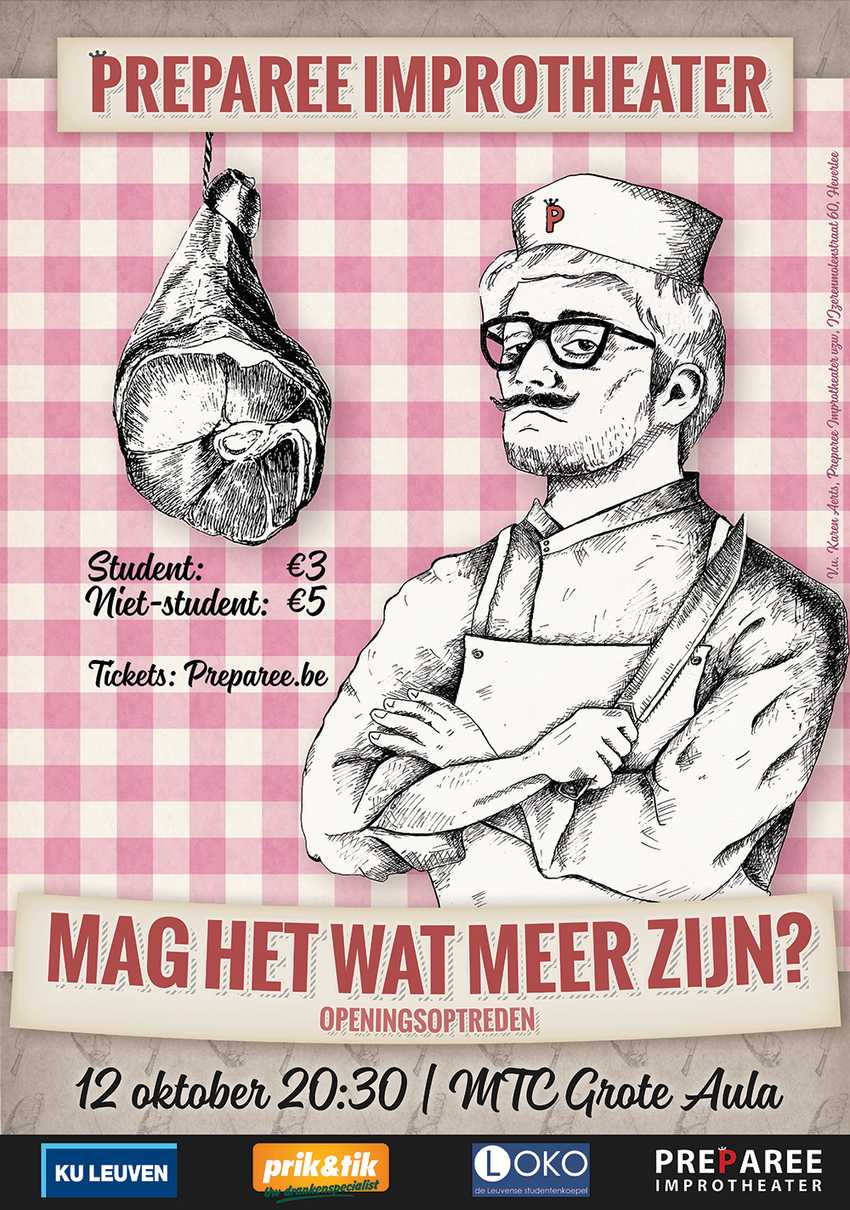
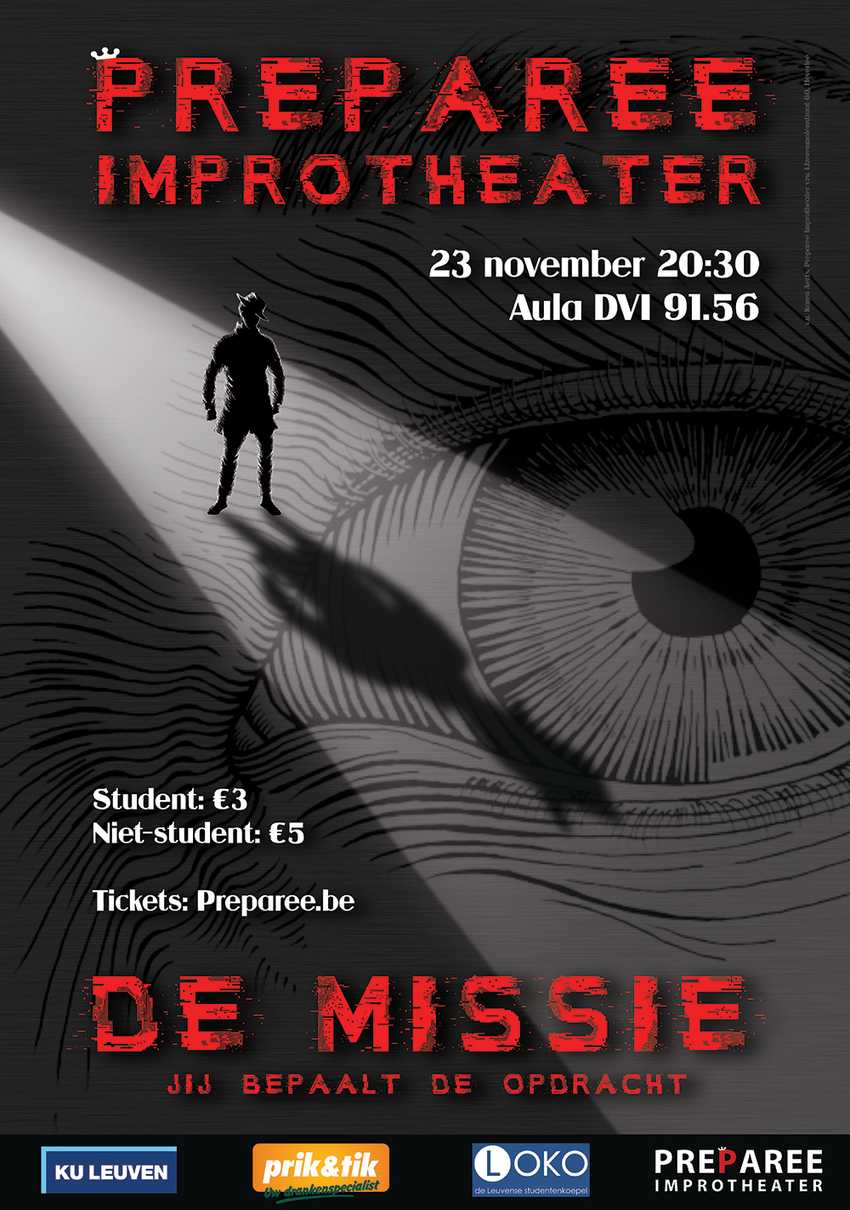
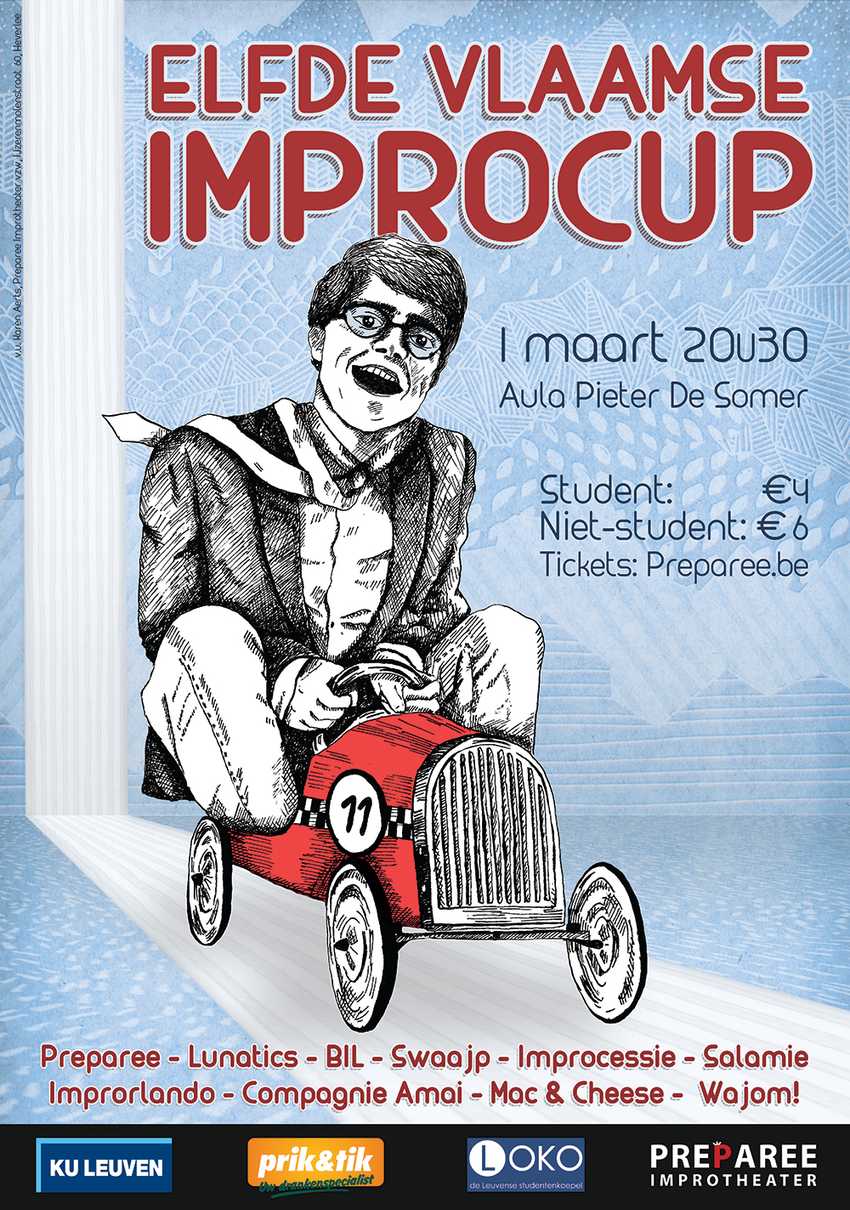
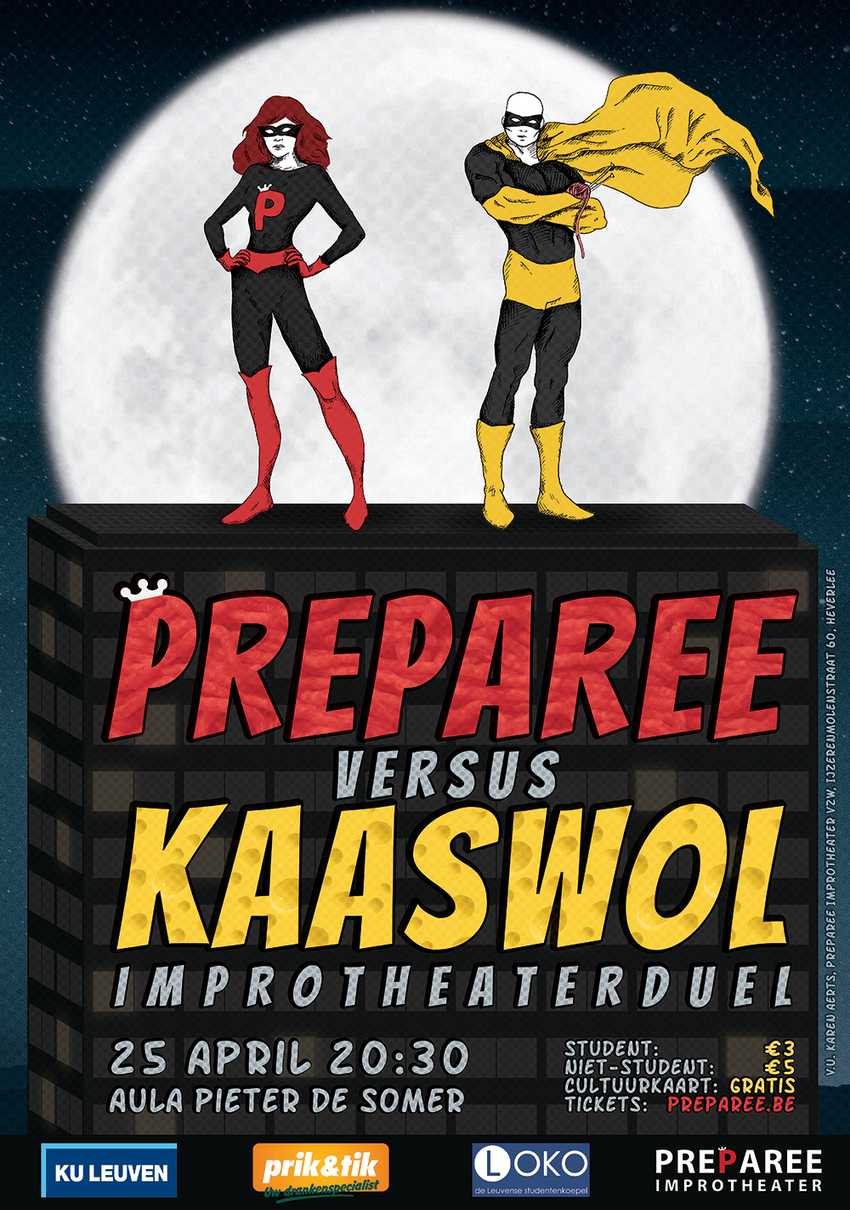
Committee tasks & contributions
Preparee has been one of my largest hobbies I've ever had. I have been an active member since 2014, during which I have attended hundreds of training workshops, taught about fifty workshops, and restructured several internal structures for the better.
In the academic year of 2016-2017, I was one of the five committee members, in charge of web and bookings. This meant managing our ticket system and internal and external sites, as well as planning our internal workshops and arranging all our external shows and workshops for companies.
During my committee year, I strongly reformed most of these fields, leaving a strong influence for the years to come.

Internal workshops reorganizing
Since I was in charge of planning our internal training workshops, I decided to reform how Preparee trained. The knowledge and experience I gained from my year in the Bristol Improv student improv troupe, as well as improv theory books, were great sources of inspiration for these reforms.
One pain point I helped resolve was because we used to train in multiple different subgroups, where the training options used to be chosen arbitrarily. However, improvisers were usually coming to workshops for two different internal reasons, which differed per person, per night:
- They either wanted to have some fun by playing some improv scenes with some friends
- Or they truly wanted to learn some new improv skills
As such, I made sure to always plan trainers such that there was one learning-oriented training, as well as one training where members could just play a lot of scenes without any interruptions.
This change led to even more changes in the further years, giving people more sense of choice, fewer frustrations, and more ability to gain improv knowledge within our improv troupe.
Try-outs
Another point of pain I helped resolve in the group was in regard to our shows. While playing five enormous improv shows was amazing, it led to several issues:
- The shows were usually structured very similarly, namely just a lot of short-form improv games.
- The committee decided who would play these shows (since a lot was at stake), meaning performers didn't get to pick who they improvised with on stage.
- Some improvisers wanted to perform many more shows than they were selected for by the committee to perform
- There was no room to invent nor perform long-form formats (=improvised stories of about 20-60 minutes) since this would require the ability to have multiple workshops with the same people and a show without all our classic short-form games.
- There was only one moment per week that members could do improv, while several dedicated members longed for more.
To solve all these issues, I introduced a show format called Try-outs, in which members were allowed to claim a time slot of any length to perform a self-made format with people they chose themselves. They usually come up with completely new ways of playing improv, with new types of audience interaction and ways of playing long improvised stories. The stakes are also much lower than our usual show since we only book a stage for 100 audience members, leaving a lot of room for experiments.
This show happens twice a year, at the end of each semester, and is completely independent of our usual five shows. Given that this is such a small stage and that we usually have multiple groups, totaling up to about 20-30 people on stage, we barely need to do any advertisements for the show. This leaves the committee with barely any organizing work apart from booking rooms for the groups to invent and practice their format.
As one member put it after the first edition: "This is the format we always needed but never realized we needed."
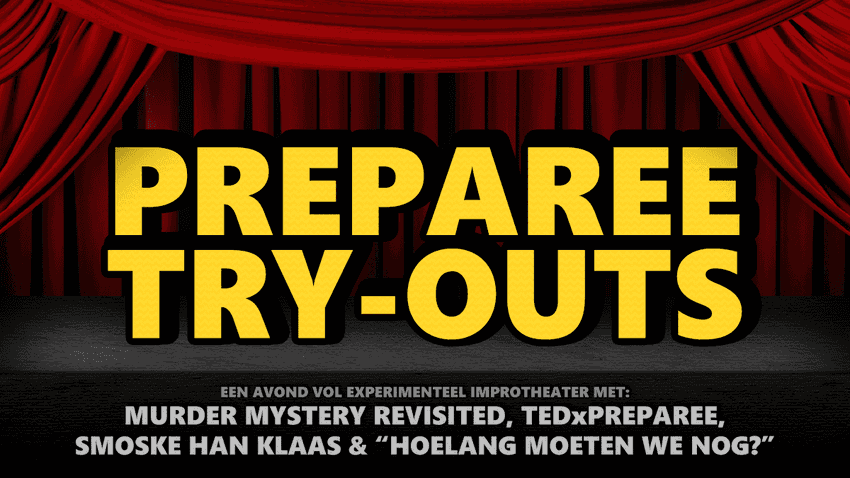
Renewed front page
The main Preparee.be website used to run a Drupal site with news and photo sections and having core information spread over many different pages. The content of this site was, however, barely used nor updated, given the rise of our Facebook page years earlier.
It was thus only logical to completely renew Preparee's front page by turning it into a simple and responsive one-pager landing page, which you can view on preparee.be.
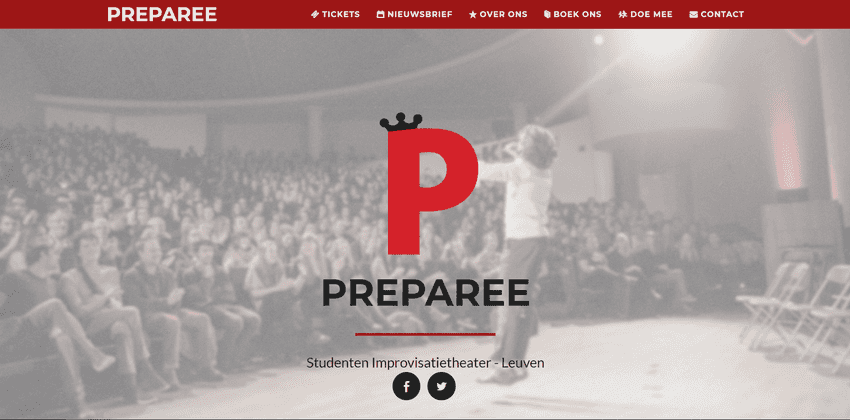
Build an improv group management platform
Preparee used to have a wiki containing information about upcoming workshops, where members could also apply to be a presenter or actor for shows. This system sadly broke right before Preparee's web facilities became my responsibility.
I thus built a completely new management system from scratch, designing the back-end and front-end exactly for the needs of our improv group. The system was called Preparee Ketchup because in Preparee, everything is named after ingredients of a Broodje Martino, and because it's the place where you can catch up on events and improv knowledge.
On the platform, you could easily mark your attendance, apply for any kind of role for any event, track how active members were, and upload information about improv games, theories, and workshop preparations.
Over the years, many other improv groups knocked on my door, expressing their need for a similar system, as it solved many of the management issues a typical improv troupe has. Because of this, I opened up the platform for other improv troupes and turned it into impy.app, which is now used by most of the large improv groups in Flanders.

Performing
Presenting
Over the years, I've presented many improv shows for Preparee. Presenting a show is one of the largest tasks in an improv show, as it involves:
- coaching the improv players in several sessions before the show
- finding right improv games to play for the group
- coming up with interesting audience interactions tied to the theme of the show.
- directing the improv scenes on stage
Presenters thus require in-depth insight into the improv. Especially because they are responsible for choosing audience suggestions and ending scenes during the show. Choosing bad suggestions or ending a scene too early or too late can completely ruin the improvised scene.
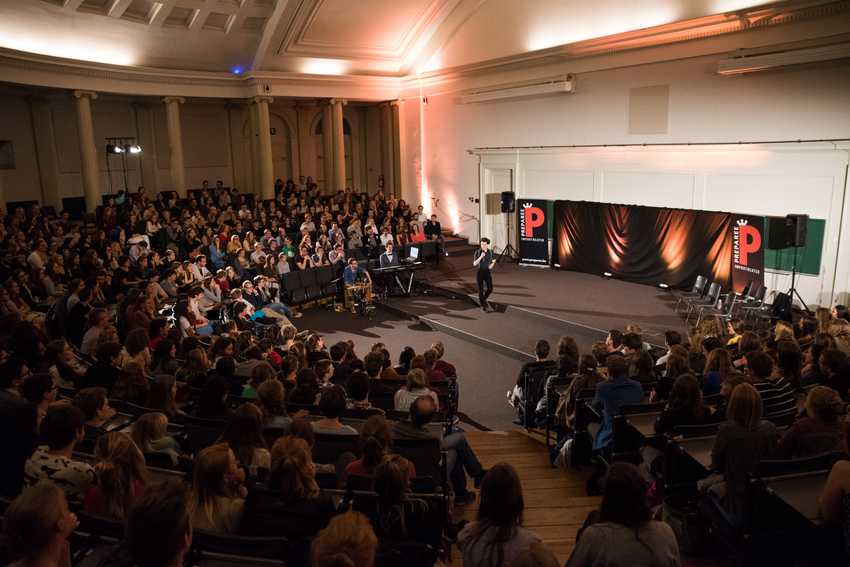
Inventing & performing novel formats for the Try-outs show
As explained earlier, the Try-outs show is a show where groups get complete freedom in what kind of improv they want to perform. For this show, I helped create and performed in several exciting new improv formats, such as:
Improvised Murder Mystery: A classic whodunnit, where one of the characters mysteriously dies, and the audience has to guess who the murderer is. We adapted this idea from Degrees of Error's murder mystery show, which I learned during my Erasmus in Bristol.
Can't Mess with Free Will: A show where two narrators each receive a goal from the audience that they must lead the performers to fulfill, without the other narrator and the actors knowing what that goal is. These narrators can only set location details and thus have no control over the will, thoughts, or emotions of the characters. The performers and the other narrator are thus completely free to make the story steer somewhere completely different than a narrator pushes them.
The Curious Village: All improvisers are members of a village that has a secret, chosen by the audience. For example, the audience could choose that the improvisers are a Roman city where all villagers turn into animals at night. Everything goes well, until one day, a wanderer arrives, played by an actor who is unaware of the secret. Can they figure out the secret in time, and can they help or even escape the villagers?
Hoelang moeten we nog?: The story of two mob leaders who have been nemesis since the dawn of time, Don Luigi and Don Castello. Or at least, that's the plan because one of the bosses gets killed, leaving the other to fill the rest of the 20-minute show. This prompts the two actors to constantly go to the (on-stage) writers' room, where they find new interesting places for the mafia boss to be based on written-down anecdotes from the audience. After every scene, there is only one question: "How long does this need to go on?", how long can Don Luigi keep going if his only... friend is no more?
Wikiwaarheid: An improvised panel show, where four contenders try to convince the presenter and the audience that they did read a particular Wikipedia article. They improvise the whole content of this article based on the title that one of the four submitted earlier. Can the audience correctly guess who is telling the truth in every round?





